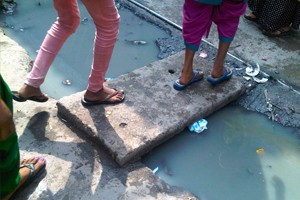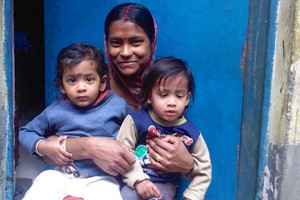“Sometimes I go without eating proper meals for two to three days – so that I don’t have to ‘go’,” says Shuchita, a master’s student. Although she lives in the midst of the Indian capital, she doesn’t have a working toilet nearby – and venturing from her neighbourhood puts her at risk of sexual harassment, or worse
This is one of the personal stories documented after a confronting visit to a Delhi slum, by Basudha Banerji, who works for All India Radio. She and eight other broadcasters joined nine workers from development charities to participate in Mainstreaming Gender in the Media, a workshop run by the Public Media Alliance in India.
Funded by Unesco, the event aimed to help media-train people who work for NGOs – to be able to encourage journalists to pick up the gender issues they work on as news stories. But it was also to help train the media to be sensitive and aware of gender-focused work of NGOs and to learn how to collaborate with them.
The participants represented a cross-section of producers and editors, and NGO directors and activists, all from Bangladesh, India or Sri Lanka. The workshop, held this February, was led by Kate Butler, a British producer and media trainer, with the support of Tinku Ray, a former BBC correspondent in Delhi.
No hidden agenda

Throwing journalists and campaigners together broke down barriers and the trainers observed they learned a lot from each other. “I came with the view NGOs had hidden agenda,” noted one of the media participants, “but [now] realise they are as committed as journalists.”
At the heart of the three-day workshop was the visit to an informal settlement on the south side of Delhi called Ekta Vihar – home to at least 2,000 people, many of them internal migrants from the countryside who come to the capital for work or study opportunities. The visitors described the incongruity of plush high-rise apartments opposite a ‘colony’ of tiny rooms separated by alleys – ramshackle walkways flooded with refuse, dirty water, sewage.
The idea behind the field trip was to encourage journalists to think about how projects that are helping women’s health, social and economic standing can be reflected in programming. And it gave all participants the chance to use live issues and a real event as a focus for their skills. Maitri, an NGO working in the area, and specialising in combating gender-based violence, was organising a ‘shramadana’ or voluntary day of action and cleanup.
Journalists were paired with NGO staff, and Maitri helped them meet women from the slum they had been working with. They were encouraged to interview them and gather interesting human stories. Some of the participants then wrote press releases for the Maitri event, while others produced radio content.
Many of the women in Ekta Vihar face daily harassment from men who are struggling to work, and have drink or drug problems. Water is in short supply – women have to queue daily to collect water from a pipe which only comes on for an hour.

The group sharpened their listening skills and found out what mattered to the people living there – they picked up on personal reflections such as those of Shuchita above, or Anjana, who talked about how sanitation was being used for local political point-scoring. Nilima, 21, lamented the fact that her husband – who works in a cycle shop – doesn’t earn enough to care for them and their twin sons, but won’t allow her to work.
There was no water to wash my school uniform, so I couldn’t go
One of the participants, Leelangi Wanasunder, the head of an NGO in Sri Lanka asked a girl in the settlement called Vindya why she wasn’t in school that day: “There was no water to wash my uniform. It is dirty and I have only one uniform, so I couldn’t go.” Water and sanitation truly were the touchstone issues.
Another member of the group, a reporter from Bangladesh Community radio, taped five interviews, while Shri Vijendra Sajwan from All India Radio used his phone to record clips which he later made into a ten-minute package to play back and discuss with the group.
Social (media) impact
Kate Butler, who led the training, observed: “Both journalists and NGOs were moved by the experience. All engaged with the inhabitants, and it was interesting for all the participants to see what different perspectives they chose to reflect in their stories, or press releases.”
The group then reviewed and debated each other’s work, and heard from experts such as Amitabh Kumar, Head of Media and Communication, at the Centre for Social Research. Kumar gave a stimulating presentation on some of the gender-issue campaigns run by his NGO. He talked about the power of crowdsourcing, and using both social media and traditional media to engage with all sectors of society. He had a considerable impact on both the groups, as until then many of the participants were reticent about using social media.
Other strong and real-life local examples of using video and media for awareness-raising were discussed, and this exposure to harnessing social media was particularly enlightening for the journalists, as it seems that the NGO staff had had more experience utilising these tools. Fittingly, one of the participants has now set up a Facebook page for the group, to carry on the collaborative working between journalists and NGOs.
And the workshop has borne fruit in terms of proposed projects. Plans include: Doordarshan, India’s television PSB to work with Rishi Kant, a social activist at the workshop, to create features exploring the impact of female foeticide in the state of Haryana, and the fate of trafficked women after rehabilitation; and one of the Sri Lanka NGOs at the workshop, the Siyath Foundation, working with India’s parliament broadcaster to develop a documentary incorporating women’s own stories self-shot on mobile phones and contrasting these with how lawmakers frame women’s issues.
See more images from the workshop in the article below
Related Posts
20th January 2015
Three nations’ public broadcasters join forces for Cricket World Cup
11th June 2014
Workshop to discuss digital future of public media for kids
The CBA is to hold a pre-summit…
5th November 2013
International broadcasters in the battle for influence
The contest between public media brands…